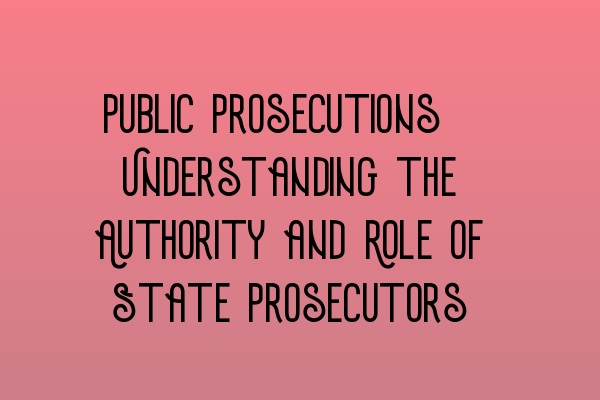Public Prosecutions: Understanding the Authority and Role of State Prosecutors
Welcome to the SQE Criminal Law & Practice Law UK blog! In this post, we will delve into the authority and role of state prosecutors in public prosecutions. Understanding the responsibilities and powers of these professionals is essential for anyone aspiring to excel in criminal law.
What is a State Prosecutor?
A state prosecutor, also known as a public prosecutor, is a legal professional who represents the interests of the state in criminal proceedings. These dedicated individuals are responsible for bringing charges against individuals accused of committing crimes and presenting evidence in court to prove guilt beyond a reasonable doubt.
The role of state prosecutors is crucial in upholding the rule of law and ensuring justice is served. They have the authority to decide whether to initiate legal proceedings, negotiate plea bargains, and determine the appropriate charges in accordance with the evidence gathered during the investigation.
State prosecutors are typically employed by government agencies, such as the Crown Prosecution Service (CPS) in England and Wales. Their ultimate goal is to seek justice by holding offenders accountable for their actions in a fair and impartial manner.
The Authority of State Prosecutors
State prosecutors are vested with significant authority when it comes to handling criminal cases. They have the power to:
- Initiate Legal Proceedings: State prosecutors initiate legal proceedings by filing charges against the accused. They carefully review the evidence provided by law enforcement agencies and decide whether a case has sufficient merit to be brought to court.
- Negotiate Plea Bargains: In certain cases, state prosecutors may negotiate plea bargains with the defense. A plea bargain is an agreement where the accused agrees to plead guilty to a lesser charge or accept a reduced sentence in exchange for cooperation or other considerations.
- Determine Charges: State prosecutors are responsible for determining the charges to be filed against the accused based on the evidence available. This decision-making process requires a thorough understanding of the law and an evaluation of the strength of the evidence.
- Present Evidence: State prosecutors present the evidence gathered during the investigation to the court. They must prove the guilt of the accused beyond a reasonable doubt, ensuring a fair trial and protecting the rights of the defendant.
Working with State Prosecutors
For individuals practicing criminal law or aspiring to become criminal lawyers, understanding the authority and role of state prosecutors is crucial. Building positive working relationships with state prosecutors can greatly enhance one’s ability to navigate the legal system effectively.
Collaborating with state prosecutors involves effective communication, negotiation skills, and a comprehensive understanding of the legal framework. By developing strong professional connections and maintaining open lines of communication, defense attorneys can effectively represent their clients and advocate for their best interests.
Conclusion
State prosecutors play a vital role in upholding the rule of law and seeking justice in criminal cases. Understanding their authority and responsibilities is essential for anyone pursuing a career in criminal law. By appreciating the authority and working diligently with state prosecutors, legal professionals can strive to achieve fair and just outcomes for all parties involved.
